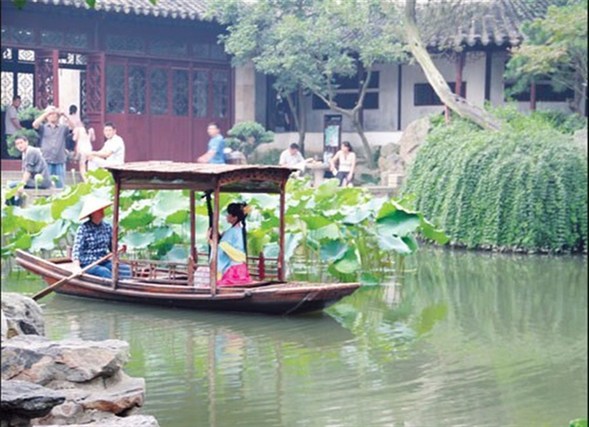Ancient tales sprout in traditional gardens
 0 Comment(s)
0 Comment(s) Print
Print E-mail Shanghai daily, April 29, 2015
E-mail Shanghai daily, April 29, 2015
|
|
|
The garden in Liu Yuan is filled with poetic scenes. |
"Up in the sky there is heaven and down on earth, there are Hangzhou and Suzhou.”
This old Chinese saying dates back more than 1,000 years but still wields a strong lure among tourists who come to China nowadays. With good reason: the charming waterside city of Suzhou has everything to drive curiosity. This old silk capital is still associated today with images of traditional buildings and glorious gardens. For expatriates living in China and foreigners traveling in the country, this is a great way to dive into ancient Chinese culture.
Some foreigners might think that once you have seen a Chinese garden you have seen them all; but this is far from true. Each Chinese garden has its own stories, secrets and legends. Visitors need only to dig a little deeper to stimulate their imaginations. And for travelers who want to daydream while admiring the finest of Chinese traditional gardens, Suzhou is the place to do it.
Tiger Hill or Huqiu
Crossing the bridge leading to Tiger Hill and glancing at the traditional wooden boats floating on the canal signals the beginning of a metaphorical journey to ancient China. Tiger Hill is one of the most interesting historical places in Suzhou. This is where He Lu, King of State Wu and founding father of the city, was buried. According to the legend, three days after his funeral a white tiger was seen on the hill, hence the name.
Sight Gathering Village has a very picturesque entrance with its rock gate in front of a small cascade. The village is blessed with an impressive collection of hundreds of bonsai trees divided into two areas: stump-bonsai and water stone bonsai. Inspired by nature, this art originated in China more than 1,300 years ago. At the time, the small trees were seen as a luxury and were offered as presents.
This bonsai collection is so impressive that visitors get a surrealistic feeling walking beside these Zen miniature trees. Many foreigners come to Tiger Hill specifically to see the bonsai trees. This is very odd to most Chinese, who believe only old people are interested in the ancient art.
Getting back on the small path embracing the shores of the river that surrounds the hill, walk toward Plum Blossum Teahouse, which serves the famous white cloud tea, a specialty from Suzhou. From the first floor of the small teahouse, one can get a glimpse at the city’s skyscrapers. The view creates an astonishing contrast with the grounds in Tiger Hill and is a reminder that modern China is only a few minutes from this peaceful retreat. Traditional Pingtan Opera performances are staged in the teahouse.
Nearby is Sword Pool, one of the most well-known scenic spots in Tiger Hill. It also marks the entrance to He Lu’s tomb. Some 3,000 swords are said to have been buried here in his honor. Surprisingly enough, the natural carving of the pool also looks like a flat sword.
The leaning cloud rock pagoda overlooking the hill is another popular draw. As the most famous leaning pagoda in China, it is a protected site and is commonly considered the symbol of Suzhou. The octagonal pagoda is often compared to the Leaning Tower of Pisa but was built more than 200 years earlier than the famous Italian structure. The pagoda was built during the Five Dynasties Period (AD 907-960) and completed in AD 961.
Next up is a walk to the northern part of the hill, which is less frequented and much wilder. Elina, an employee at Tiger Hill, says she loves walking in this area around noon as the bamboo forest soothes the soul. This area features two newly constructed gardens. A reflection of the pagoda in the lake, where herons can be seen, is popular among photography enthusiasts. Lotus flowers bloom in the lake in late summer.
Tiger Hill’s popularity also lies in the legends associated with each waterway, rock and tree. Learn about the origins of Chinese myths as well as the attachment of Chinese culture to these popular histories. One of the most beautiful myths is the legend around Han Han Fount, which contains the purest water in Suzhou and is used in the making of the finest tea. According to the myth, two Buddhist monks were above the hole and one announced that water could not be found there. The other said he would still try and dig it. The former then declared that if water was found he would become a frog. Today, beside the Han Han spring is a stone that resembles the head of a frog coming out of the ground. Another legend is about Han Han, a blind man who recovered his sight as soon as his eyes touched the sacred water.
Tiger Hill is but one reminder that China’s heritage and history run deep.







